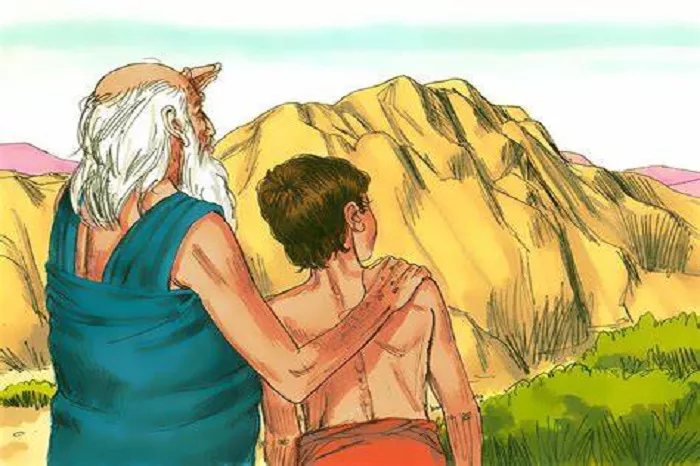Mount Moriah is the site of one of the most profound events in the Bible. In Genesis 22, Abraham is tested by God in a dramatic and intense way. This event holds significant theological and moral lessons for believers.
The Context of Genesis 22
Abraham’s Journey of Faith
Abraham, originally named Abram, is called by God to leave his homeland. He is promised numerous descendants and a land for his people. Throughout his journey, Abraham demonstrates faith and obedience.
The Birth of Isaac
Isaac is the long-awaited son of Abraham and Sarah. His birth is a fulfillment of God’s promise to Abraham. Isaac’s presence signifies hope and the continuation of God’s covenant.
See Also: Who Is the Mother of Isaac in the Bible?
The Command to Sacrifice Isaac
God’s Test
In Genesis 22:1-2, God tests Abraham’s faith. He commands Abraham to take Isaac to the region of Moriah and sacrifice him as a burnt offering. This command is shocking and heart-wrenching.
Abraham’s Obedience
Despite the difficulty of the command, Abraham obeys. He sets out early the next morning with Isaac and two servants. This obedience underscores Abraham’s deep faith in God.
The Journey to Mount Moriah
Three-Day Journey
The journey to Mount Moriah takes three days. This period allows for contemplation and highlights the gravity of the task.
Leaving the Servants Behind
When they reach the foot of the mountain, Abraham instructs his servants to stay behind. He says he and Isaac will worship and then return. This statement reflects Abraham’s hope and faith.
The Climb to the Mountain
Isaac’s Question
Isaac carries the wood for the offering, while Abraham carries the fire and knife. Isaac notices something is missing and asks, “The fire and wood are here, but where is the lamb for the burnt offering?” (Genesis 22:7). Abraham responds, “God himself will provide the lamb for the burnt offering, my son” (Genesis 22:8). This response is profound and prophetic.
Building the Altar
Upon reaching the designated place, Abraham builds an altar. He arranges the wood and binds Isaac. He then places Isaac on the altar.
The Act of Faith
Raising the Knife
As Abraham raises the knife to sacrifice his son, an angel of the Lord calls out to him. “Do not lay a hand on the boy,” the angel says. “Do not do anything to him. Now I know that you fear God, because you have not withheld from me your son, your only son” (Genesis 22:12).
God’s Provision
Abraham looks up and sees a ram caught in a thicket. He sacrifices the ram instead of his son. This provision underscores God’s faithfulness and the theme of substitution.
The Aftermath
The Blessing
After the sacrifice, the angel of the Lord calls to Abraham a second time. He reaffirms God’s covenant and promises numerous descendants. This blessing is a reward for Abraham’s faith and obedience.
Naming the Place
Abraham names the place “The Lord Will Provide.” This name commemorates God’s provision and faithfulness.
The Significance of Mount Moriah
A Place of Testing
Mount Moriah is a place of testing. Abraham’s faith and obedience are tested to the extreme. This test reveals the depth of his trust in God.
A Foreshadowing of Christ
The event on Mount Moriah foreshadows the sacrifice of Jesus Christ. Isaac, the beloved son, carrying the wood, is a type of Christ carrying the cross. The ram provided by God symbolizes Christ as the ultimate sacrifice.
A Lesson in Faith and Obedience
Abraham’s willingness to sacrifice Isaac teaches profound lessons in faith and obedience. Believers are called to trust God completely, even when His commands are difficult.
Theological Implications
God’s Sovereignty
The event on Mount Moriah highlights God’s sovereignty. He has the authority to test and command His followers. His provision demonstrates His control over all circumstances.
Faith in Action
Abraham’s actions demonstrate that true faith is accompanied by obedience. Faith is not merely intellectual assent but is shown through actions.
The Concept of Substitution
The provision of the ram introduces the concept of substitutionary atonement. This idea is fully realized in the New Testament with the sacrifice of Jesus for humanity’s sins.
Lessons for Believers Today
Trusting God’s Promises
Believers are called to trust God’s promises, even when circumstances seem contrary. Abraham’s trust in God’s promise of descendants through Isaac is a model for believers.
Obedience to God
Obedience to God, even in difficult situations, is a mark of true faith. Abraham’s willingness to sacrifice Isaac demonstrates total submission to God’s will.
God’s Faithfulness
God’s provision of the ram reminds believers of His faithfulness. God provides for His people and keeps His promises.
The Call to Sacrifice
Believers are called to a life of sacrifice. This may not mean literal sacrifice, but it involves giving up personal desires and trusting God’s plan.
Conclusion
The event on Mount Moriah in Genesis 22 is a profound narrative. It is a story of faith, obedience, and divine provision. Abraham’s willingness to sacrifice Isaac is a testament to his trust in God. God’s intervention and provision of the ram highlight His faithfulness and mercy. This event foreshadows the ultimate sacrifice of Jesus Christ, providing a deeper understanding of God’s redemptive plan. For believers today, the story of Mount Moriah serves as an enduring lesson in faith, obedience, and the assurance of God’s promises.


